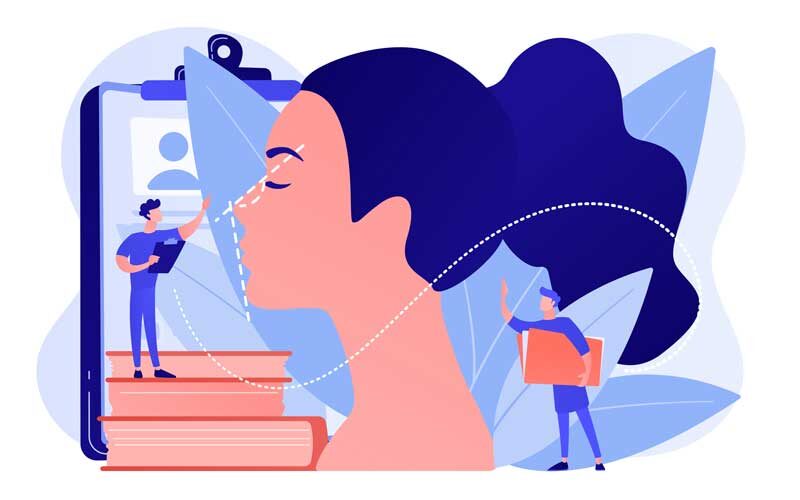In today’s world, beauty has become more than just an aesthetic quality—it is increasingly seen as a form of capital that directly influences one’s confidence, success, and social acceptance. Within this context, plastic surgery has rapidly spread as a means of self-expression and a tool to enhance social competitiveness. No longer limited to celebrities or specific social classes, cosmetic procedures have become widely accessible. People can now book surgeries with a few taps on their smartphones and share before-and-after photos on social media, exchanging information and reviews in real time. Plastic surgery has become deeply embedded in our everyday lives as a common and accepted option.
However, this ease of access, combined with idealized beauty standards(Nagara and Nurhajati., 2022) perpetuated by the media, has led to a new and growing problem: plastic surgery addiction. Increasingly, individuals undergo repeated procedures driven by obsessive dissatisfaction with their appearance. This compulsive pursuit of physical perfection often stems from deeper psychological(Spataro., 2019) and emotional issues, including low self-esteem, body dysmorphia(Spriggs and Gillam., 2016), and even identity confusion. In severe cases, it can lead to significant physical and mental health complications.
This article explores the causes of plastic surgery addiction, its sociocultural influences, and the physical and emotional consequences it can have on individuals. Ultimately, we ask: is cosmetic surgery truly a personal choice for self-improvement, or is it an unconscious submission to socially constructed ideals?
Psychological Roots of Plastic Surgery Addiction
Plastic surgery addiction is not simply a matter of being unhappy with one’s looks. At its core lie issues such as low self-worth, mental health struggles, and an overwhelming concern with how others perceive us. For many, repeated surgeries are not motivated by a desire for beauty alone, but function as a coping mechanism to ease inner anxiety. The less confidence one has in their identity, the more likely they are to rely on surgery as a temporary source of relief or validation.
The Role of Media and Social Culture
The media—especially social media—plays a significant role in normalizing and even encouraging plastic surgery addiction. Platforms like Instagram, YouTube, and reality TV (Sperry et al., 2009)constantly promote idealized beauty through carefully curated and edited images. Stories of “successful” transformations are glamorized, making people to compare themselves to unrealistic standards. This relentless exposure fosters self-surveillance and dissatisfaction, pushing individuals toward continuous cosmetic enhancements.
Furthermore, when beauty is framed as a key to success, appearance becomes a social requirement rather than a personal preference. The societal tendency to measure value by looks creates structural pressure that encourages people—particularly young and impressionable individuals—to conform. This cultural climate fosters a cycle in which repeated surgeries seem acceptable and necessary.
Personal Consequences of Addiction
The effects of plastic surgery addiction extend far beyond superficial changes. Physically, multiple procedures can result in skin damage, infections, nerve injuries, and complications from repeated anesthesia. In some cases, excessive alterations lead to unnatural appearances or facial immobility, causing more harm than good.
Emotionally, the failure to achieve one’s desired outcome can trigger deep disappointment, anxiety, depression, or even self-harming behavior. What begins as a pursuit of self-improvement may end in emotional turmoil and a deteriorated sense of self. Thus, plastic surgery addiction is not a trivial concern—it is a complex issue that profoundly affects a person’s mental health and overall quality of life.
Cosmetic surgery can be an effective way to resolve insecurities and enhance self-confidence. In a society where appearance influences personal and professional opportunities, the decision to undergo surgery should not be inherently criticized. The problem arises when surgery becomes a means of suppressing deep-seated dissatisfaction and reinforcing a distorted self-image.
Plastic surgery addiction represents a vicious cycle of constant self-negation fueled by the pressure to become “more beautiful.” This is not solely the result of individual psychological vulnerabilities but is closely tied to broader structural issues. Media and pop culture propagate exaggerated beauty ideals, promoting the notion that attractive people are more successful, lovable, and worthy. As a result, beauty becomes a tool to prove one’s value, rather than a personal choice.
To address this problem, society must not simply condemn plastic surgery, but work toward building healthier perceptions of beauty. We need to reduce appearance-based prejudice and promote diverse expressions of beauty. Education systems, especially for youth, must support identity formation rooted in inner values and self-respect rather than outward appearance.
Institutional support is also necessary. Psychological counseling should be integrated into pre- and post-surgery processes, and public awareness campaigns must highlight the risks of cosmetic surgery addiction. While beauty standards may change over time, the ability to accept and respect oneself is the timeless foundation of a healthy life.
Ultimately, true beauty does not lie in flawless features, but in self-acceptance and the ability to live in harmony with others. Through the lens of plastic surgery addiction, we are invited to reconsider how society defines beauty—and what it means to be truly human.
Reference list
Nagara, M.R.N.D. and Nurhajati, L. (2022). The Construction and Adoption of Beauty Standard by Youth Female as the Consumer of K-Beauty Products in Indonesia. Jurnal Riset Komunikasi, 5(2), pp.258–277. doi:https://doi.org/10.38194/jurkom.v5i2.543.
Spataro, E.A. (2019). Surgical Site Infections in Cosmetic Surgery. Advances in Cosmetic Surgery, 2(1), pp.29–40. doi:https://doi.org/10.1016/j.yacs.2019.02.010.
Sperry, S., Thompson, J.K., Sarwer, D.B. and Cash, T.F. (2009). Cosmetic Surgery Reality TV Viewership. Annals of Plastic Surgery, 62(1), pp.7–11. doi:https://doi.org/10.1097/sap.0b013e31817e2cb8.
Spriggs, M. and Gillam, L. (2016). Body Dysmorphic Disorder: Contraindication or Ethical Justification for Female Genital Cosmetic Surgery in Adolescents. Bioethics, 30(9), pp.706–713. doi:https://doi.org/10.1111/bioe.12278.
